Little Giants: A closer look at a tiny bug with a big role to play
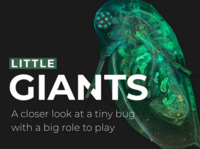
Michael Pfrender sits facing a whiteboard in his lab at the Galvin Life Science Center. He’s discussing the genomics of Daphnia – water fleas, found in every standing body of water in the world – and has a tendency to sketch when he speaks. “You want to see some of them?” he asks. “That’s the fun part, right?” At the back of the lab, two beakers sit on a table near a microscope. There isn’t much to see at first glance. Even leaning in, Daphnia are so small they look like bouncing flecks in the water, frantically trying to keep afloat.
New study finds mycobacteria can sense presence of proteins that cause disease
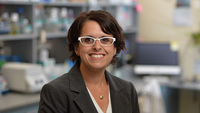
Tuberculosis-causing mycobacteria use a select group of proteins known as virulence factors to transmit the disease, which infects roughly one third of the world’s population and causes 1.7 million deaths annually. Those proteins are cargo transported by molecular machinery, a microscopic gateway that promotes the survival of bacteria in the host. A new study by researchers at the University of Notre Dame and Michigan State University, published in the Proceedings of the National Academy of Sciences, reveals that mycobacteria can sense when this molecular machine is present.
In Memoriam: Professor Emeritus Harald E. Esch
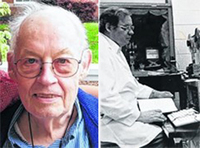
Dr. Harald E. Esch, Professor Emeritus of Biological Sciences, passed away peacefully on October 7, 2017, at the age of 85 in Farragut, TN. Dr. Esch was born in 1931 in Dusseldorf, Germany. Originally trained as a physicist and mathematician at the University of Bonn and Free University, Harald shifted to biology for his doctoral studies. At the University of Würzburg, Harald studied with Dr. Karl von Frisch, the 1973 Nobel Prize Laureate in Physiology or Medicine best known for his pioneering work on the ‘waggle dance’ of the common honeybee, Apis mellifera. Under von Frisch’s tutelage, Harald earned a doctorate in 1960 in Zoology and Mathematics for his work on insect chemosensory physiology. Harald remained in Germany until 1964 as an Assistant Professor in the Radiation Research Laboratory at the University of Munich Medical School, where he worked on the effects of ionizing radiation on cell membranes.
Biology professor’s textbook nominated for prestigious PROSE Award
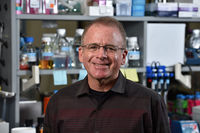
In 1996, biological sciences professor Gary Lamberti published the first edition of his textbook to fill a major need in aquatic science. Twenty-one years later, Methods in Stream Ecology, now in its third edition, is up for consideration for a prestigious PROSE Award, an annual accolade that recognizes the best in professional and scholarly publishing.
Fighting Mosquito-borne Diseases

“In general, cases of Zika have definitely decreased in most of Central and South America, but the virus is not gone. The mosquitoes carrying Zika and other diseases are still there, and the risk for another infection outbreak is still quite prevalent,” says Elitza Theel, director of the Infectious Diseases Serology Laboratory and co-director of the Vector-Borne Diseases Service Line at Mayo Clinic. Though Zika virus was identified in 1947, the World Health Organization (WHO) says it was largely localized for 60 years. In 2007, the first recognized outbreak of Zika affected 5,000 people on Yap Island in the Federated States of Micronesia. From there, it moved to French Polynesia and then in 2015 to Brazil, where an outbreak quickly devastated South America.
Top researchers and graduate students come together during first Life Sciences Symposium
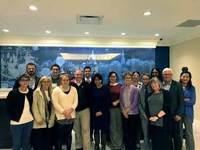
Notre Dame’s first Life Sciences Symposium brought together leading biomedical researchers for a day of lectures and poster presentations, drawing about 200 students and scientists from across the area. The event, “Bridging the Gap from Bench to Bedside,” was held Oct. 11, 2017, at the Morris Inn and was organized and hosted by students in the Department of Biological Sciences graduate program. Attendees came from Indiana, Michigan, Illinois, and Ohio to hear researchers present topics from stem cells in cancer to neurobiology and regeneration.
Undergraduate students spend summer conducting cancer research at MD Anderson
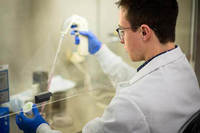
Research took precedence over relaxation for several College of Science students this summer who spent 10 weeks completing undergraduate research projects at MD Anderson Cancer Center in Houston, Texas. Two students from biological sciences, Colin Sheehan and Shane Davitt, were among the participants. The University of Notre Dame Summer Undergraduate Research Program at MD Anderson is a competitive program designed for outstanding and highly motivated undergraduate students interested in pursuing a career in cancer research. Students participated in various types of research in different labs, attended lectures and presentations, and collaborated with others as they fostered their interest in a research career path.
Summer Undergraduate Research Fellowship students thankful for new experiences
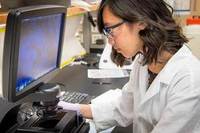
From studying Fragile X Syndrome to understanding algorithms for artificial intelligence, 47 students participated in a summer’s worth of research, thanks to the College of Science Summer Undergraduate Research Fellowships (SURF). The program is made possible through donors and in collaboration with the Center of Undergraduate Scholarly Engagement, Indiana University School of Medicine–South Bend, and the Glynn Family Honors program.
ND-LEEF to debut new “In-Nest” Eagle Cam
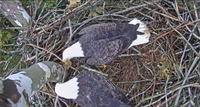
The Notre Dame Linked Experimental Ecosystem Facility (ND-LEEF) will debut its new “in-nest” livestreaming camera, mounted above the bald eagle nest located at St. Patrick’s County Park during the 5th Annual Science Sunday event Oct. 22. While the previous camera was popular, with 100,000 live feed views, its low angle prevented viewers from seeing eagles when in the nest and made it hard to see them when leaves were present in summer.
Deputy Director of President’s Malaria Initiative to Lead Notre Dame’s Eck Institute for Global Health
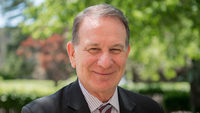
Bernard Nahlen, currently deputy director of the President’s Malaria Initiative, will join the University of Notre Dame as director of the Eck Institute for Global Health and professor of biological sciences in the College of Science.
Notre Dame Research Shows Promising Results for Improving Pancreatic Cancer Treatment
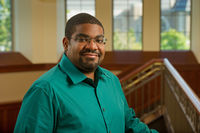
New Notre Dame research has been used to support the Orphan Drug designation for IT-139, a compound that when used in combination with chemotherapy has proved to be significantly more effective in treating pancreatic cancer than the current standard of care. The Orphan Drug program is administered by the Food and Drug Administration (FDA) and identifies promising drugs that are intended for the treatment of rare diseases, which impact fewer than 200,000 Americans at any time, or affect more than 200,000 people but are not expected to recover the costs of developing and marketing a treatment drug. Currently, pancreatic cancer has one of the lowest cancer survival rates, with one-year and five-year rates of 20 and 7 percent, respectfully.
Researchers Receive $1.5 Million NSF Award to Study Sustainability of Recreational Fisheries
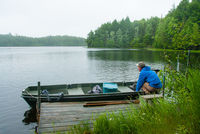
Recreational fishing is a longstanding American outdoor tradition, generating $25 billion annually. Whether fishing on lakes, rivers or streams; from shorelines, boats or embankments; freshwater fishing remains the most popular form of fishing, attracting more than 37 million participants last year. While recreational fisheries are culturally and economically valuable, freshwater ecosystems are vulnerable to degradation and collapse.
New NIH-funded research to solve problem of drug-resistant malaria
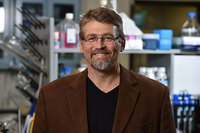
University of Notre Dame biologist Michael Ferdig, Ph.D., is leading a new $11.5 million program project (P01) grant from the National Institutes of Health (NIH). Ferdig and his team at Notre Dame are partnering with researchers at the Center for Infectious Disease Research (CID Research) in Seattle and Texas Biomedical Research Institute (TBRI) to better understand the genes in the malaria parasite that are responsible for drug resistance and virulence in order to reduce and ultimately eliminate the often deadly disease.
Jennifer Tank elected President of the Society for Freshwater Science
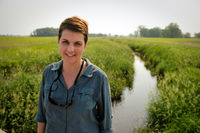
Jennifer Tank, Galla Professor in the Department of Biological Sciences at the University of Notre Dame and director of the Environmental Change Initiative, has been announced as the president-elect of the Society for Freshwater Science (SFS).
Notre Dame Research Funding reaches Record-breaking Levels
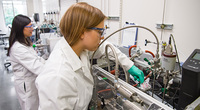
The University of Notre Dame has received $138.1 million in research funding for fiscal year (FY) 2017, surpassing the previous record of $133.7 million set in FY 2015.
Undergraduate students present research at 2017 COS-JAM
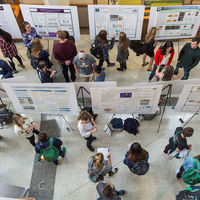
More than 500 students attended the 11th College of Science Joint Annual Meeting (COS-JAM) on Friday, May 5, in the Jordan Hall of Science. The event highlighted the research achievements of undergraduate students and is part of the Undergraduate Scholars Conference.
The Power of Computational Modeling to Combat Diseases
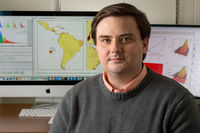
For people living in the US, the Zika epidemic of 2016 seemed to have come out of nowhere and to have now almost disappeared. Zika infections and microcephaly in newborns were daily headline news. Now where are we?
Researchers improve method to identify aquatic species using environmental DNA
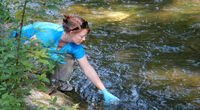
According to a new study, researchers have improved their method of tracking species by using the biological material those organisms leave behind known as environmental DNA (eDNA).
In memoriam: Robert McIntosh, professor emeritus of biological sciences
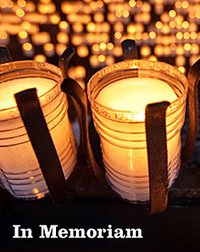
Robert P. McIntosh, a renowned ecologist and historian of ecology and wonderful husband, father and grandfather, died at 3:45 pm July 7, 2017. He was born Sept. 24, 1920, in Milwaukee, Wis., and was a football…
Researchers Use Light to Manipulate Mosquitoes
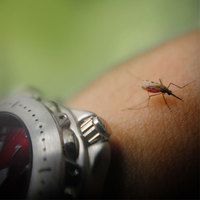
Scientists at the University of Notre Dame have found that exposure to just 10 minutes of light at night suppresses biting and manipulates flight behavior in the Anopheles gambiae mosquito, the major vector for transmission of malaria in Africa, according to new research published in the journal Parasites and Vectors.
Xin Lu wins 2017 Indiana CTSI Young Investigator Award

Dr. Xin Lu, the John M. and Mary Jo Boler Assistant Professor of Biological Sciences, in the Boler-Parseghian Center for Rare and Neglected Diseases, has been awarded a Young Investigator Award from the Indiana Clinical and Translational Sciences Institute (CTSI).
Students receive Fulbright Awards for 2017-2018
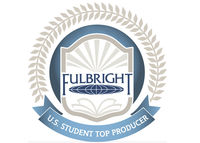
Four students from the Department of Biological Sciences have been awarded grants by the Fulbright U.S. Student Program to study abroad in 2017-18.
Biological Sciences faculty win awards for teaching and advising
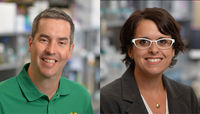
David J. Veselik, director of undergraduate studies and associate teaching professor in the department of biological sciences, was one of three recipients of the Dockweiler Awards for the 2016–2017 academic year. Veselik is the coordinator for the cell biology laboratory, as well as the biology club advisor. He has taught upper level cell biology labs and lectures. With his guidance, students have participated in several initiatives, including networking with the career center, vertical peer mentoring, lab shadowing and alumni mentoring.
Notre Dame Grad Student Chosen to Present Work at 2017 Future Fellow Research Conference
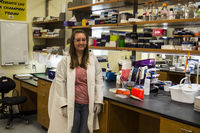
Alyssa Lesko, fourth-year Biology graduate student, was recently selected to present her work at the 2017 Future Fellow Research Conference (FFRC) at St. Jude Children’s Research Hospital in Memphis, Tennessee. Lesko will present her work on how the loss of tumor suppressor Adenomatous Polyposis Coli (APC) and subsequently how its normal functions leads to tumorigenesis. Read more.
Scientists Reveal New and Improved Genome Sequence of Daphnia Pulex
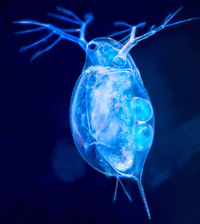
By understanding how they respond to toxic elements, scientists can look at how environmental changes caused by agriculture and road runoff or warming temperatures and climate change could impact populations in lakes, rivers and standing bodies of water.
Notre Dame researcher receives grant to study spinal cord injuries
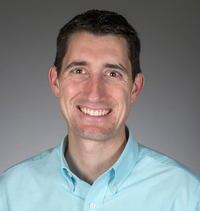
The Indiana State Department of Health and the Indiana Clinical and Translational Sciences Institute (CTSI) has awarded Cody J. Smith, the Elizabeth and Michael Gallagher Assistant Professor of Biological Sciences and affiliated member of the Center for Stem Cells and Regenerative Medicine, a Spinal Cord and Brain Injury Research Fund (SCBIRF) grant.
Funding scientific research fuels job creation

The University of Notre Dame is highlighted in a new report on the importance of scientific research to economic growth. The study, which was conducted by The Science Coalition, identifies more than 100 companies that exist due to funding received by academic researchers from federal government agencies, including the Department of Agriculture, Department of Energy, National Institutes of Health, National Institute of Standards and Technology, and National Science Foundation.
Biological Sciences Students and Alumni win Prestigious NSF Graduate Research Fellowship Awards
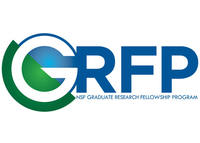
The National Science Foundation (NSF) recently announced the winners of the 2017 Graduate Research Fellowship Program (GRFP), with 15 current Notre Dame students, affiliates and alumni winning the prestigious award and another 18 earning honorable mention. Overall, 11 students in the Department of Biological Sciences were recognized by the NSF.
Kasturi Haldar wins 2017 Ganey Award for community-based research
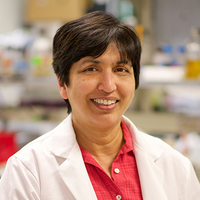
Professor Kasturi Haldar has received the 2016 Rodney F. Ganey, Ph.D., Community-Based Research Award for a project that has helped improve rare disease recognition and treatment in northern Indiana. The award is a $5,000 prize presented annually to a regular faculty member at the University of Notre Dame who has completed at least one research project that addresses a need within South Bend or the surrounding area. Haldar is a molecular cell biologist and the Rev. Julius Nieuwland Professor of Biological Sciences and Parsons-Quinn director of the Boler-Parseghian Center for Rare and Neglected Diseases at the University of Notre Dame.
Researchers develop predictive model measuring nitrous oxide emissions in streams and rivers
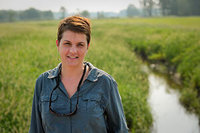
Jennifer Tank, Galla Professor in the Department of Biological Sciences co-authored new research published in the journal Proceedings of the National Academy of Sciences.